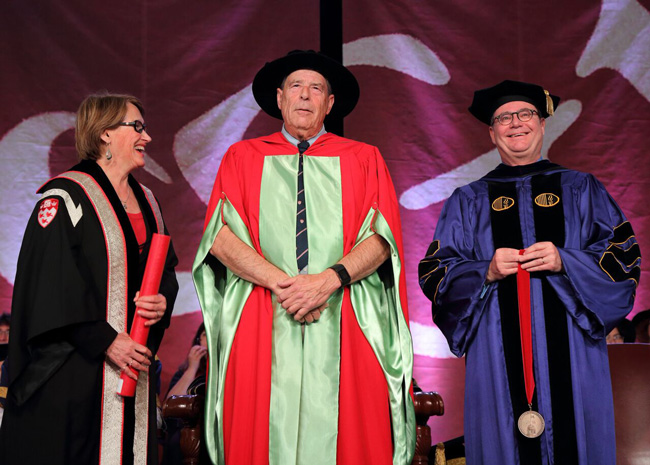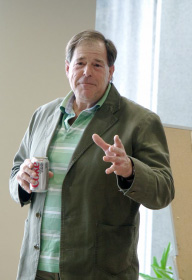
By Neale McDevitt
Established in 2009, the McGill University Medal for Exceptional Academic Achievement is awarded to retired members of McGill’s academic staff who are uniquely deserving in light of their exceptional contributions to their discipline, to the University and to society at large. One of the University’s highest honours, the McGill Medal has only been awarded to five people – Aberto J. Aguayo, Adi Eisenberg and Lawrence Mysak in 2010; Margaret Lock in 2012; and Roderick Macdonald in 2014).
As part of Spring 2016 Convocation, three McGill icons gained admittance to this exclusive club; John Bergeron, Philip Branton and Donald Taylor, featured below).
When asked how he ended up spending most of his career as a social scientist devoted to working with and helping society’s most disadvantaged people, Donald Taylor blames people like Bob Dylan and Joan Baez. “I was a kid of the 60s and I banged around on the guitar a little bit when the folk music boom was in full swing. Of course, folk music was all about championing inequality. I didn’t realize it at the time, but I was being socialized into some sort of idealistic ideology,” says Taylor. “By the time I started my research, I was going to rid the world of injustice, inequality, prejudice, discrimination and stereotyping.
“Unfortunately the world is in worse shape now than when I began,” says Taylor with a rueful chuckle. “I’m not sure what that says about me.”

But perhaps the state of the world is more a reflection of our collective shortcomings than of Taylor’s.
Over the course of his career, Taylor emerged as one of Canada’s most influential social psychologists. His work on everything from stereotyping and intergroup contact, to social identity and bilingualism has had an enormous impact around world. In the field, Taylor has championed everyone from immigrants and refugees to inner city kids in the U.S.
“The beauty of academia is that you can recharge within the structure. If you work in the private sector building widgets and you get bored with building widgets, you have to go somewhere else,” says Taylor. “I’ve been able to shift my focus here and there or change the particulars – geographically or the disadvantaged people with whom I am working. But the overriding theme remains the same.”
Another constant is his dedication to Canada’s Indigenous populations. Over the course of his 20+ years working with First Nations communities in Canada’s north, Taylor established a strong bond of trust and respect between himself and the people of these communities. A measure of this trust is reflected by Taylor having been asked to serve on the Truth and Reconciliation Commission.
Flower power and nuclear physics
Folk music and flower power aside, Taylor vividly remembers another early, less likely, source of inspiration.
Walking through the Roddick Gates on his first day on the job at McGill, Taylor tried to find the Psychology Department. Taking a wrong turn, he ended up in the Rutherford Physics Building, staring at the plaque celebrating the building’s namesake, Ernest Rutherford, Nobel Prize winner and the father of nuclear physics.
“I had been overseas in Asia doing my graduate work and I was totally intimidated with the prospect of coming to McGill, where I knew absolutely no one,” says Taylor. “But looking at that plaque, I said to myself ‘If little Ernie Rutherford can do it, let’s see what this kid can do.’ It kind of inspired me.”
Taylor also credits legendary McGill psychologist Donald O. Hebb with giving him great advice regarding keeping a healthy work balance. “When a young professor arrives in a new department, they have the tenure albatross hanging around their neck,” says Taylor. “Hebb, who I loved to pieces, used to say ‘Boy, you keep doing that stuff [publishing papers, etc.] because that’s your bread-and-butter. That’s going to prove you can do this and that’s going to pay off in publications and grants. That’s what you build your credibility on.’ Hebb said ‘You keep doing that, boy, because that buys you the time to play with big ideas and ideas that might not work.’
“Hebb always used the word big. He’d say “Boy, if you’re going to play with ideas play with the big ideas.’”
Over 30,000 undergraduates served
When asked what he is most proud of when looking back at his career, Taylor pauses. He says it is always satisfying when his research helps shape policy or influence meaningful change in his field. But he says, his proudest moment came in the classroom.
“In 47 years, I never missed a class. Never,” says the man who has taught over 30,000 undergraduates. “One Sunday night playing hockey, I was hit in the face with the puck and I took 57 stitches. Monday morning, I taught my class with one eye closed and stitches holding me together. Upon reflection, it was one of my most meaningful moments because if you care about something and it matters to you, you just do it.
“Of course a few weeks later, I was talking to some students and, they saw that I was healing up, so they said ‘Sir, that class that you came in after you were hit with the puck was hilarious.’ I said ‘Hilarious? How so?’ ‘Because we didn’t understand a word you were saying – not one word – but we felt so bad for you that we just sat there pretending.’”
While Taylor will officially retire from McGill at the end of the month, he doesn’t intend to ride off into the sunset entirely – although he may take a Cessna if the need arises.
“I’m still doing some work in the Indigenous communities,” he says. “It’s difficult to move away from that. As we see on the news all the time, many of them are in crisis.
“When you get a call and someone asks if you can help, what are you going to say, ‘I’m retired?’ No, I will get into that little Cessna again and bounce my way to wherever it is I’m needed. And I’ll see what I can do to help – but first we have to fix the generator, of course, because there is always something broken to fix,” says Taylor with a chuckle.
And when Taylor finishes lending a hand and climbs back into that small, rickety plane heading home, the world, contrary to his own assessment, will be a better place.
Read the feature on John Bergeron, one of this year’s winners of the McGill Medal.
Read the feature on Philip Branton, one of this year’s winners of the McGill Medal.
